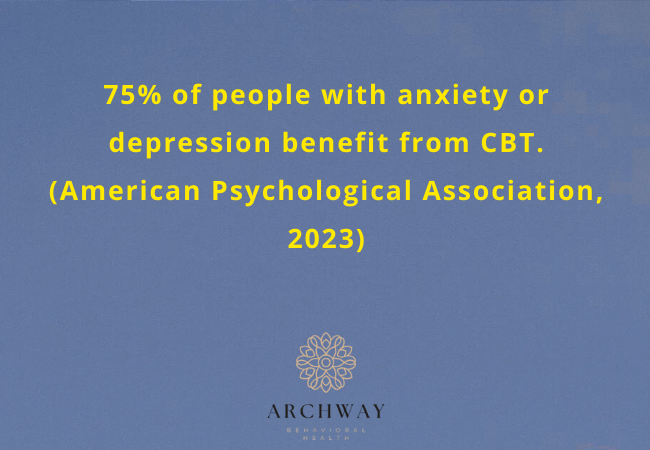Cognitive Behavioral Therapy (CBT) has become one of the most trusted, scientifically backed forms of psychotherapy for treating anxiety and depression—two of the most widespread mental health disorders globally. These conditions affect millions of people every year and can severely impact a person’s ability to work, connect with others, manage daily responsibilities, and enjoy life.
At Archway Behavioral Health, we use CBT as a foundational treatment method across various levels of care, including Individual Therapy in Florida, Group Therapy in Florida, and in structured programs like our Intensive Outpatient Program (IOP) and Partial Hospitalization Program (PHP).
This in-depth guide will explore what CBT is, how it treats anxiety and depression, and what you can expect during your sessions at Archway—so you can begin your healing journey with clarity and confidence.
What Is Cognitive Behavioral Therapy (CBT)?
Cognitive Behavioral Therapy is a structured, goal-focused, and time-limited approach that helps individuals identify and change unhelpful thoughts and behaviors.
Core Concept:
CBT is built on the principle that our thoughts, feelings, and behaviors are interconnected:
- Negative thoughts contribute to distressing emotions.
- These emotions lead to unhelpful or destructive behaviors.
- The cycle repeats—unless interrupted with new thinking and coping patterns.
CBT provides practical skills to break this cycle, making it highly effective for:
- Anxiety disorders (generalized anxiety, panic attacks, phobias, social anxiety)
- Major depressive disorder
- Obsessive-compulsive disorder (OCD)
- Post-traumatic stress disorder (PTSD)
- Bipolar disorder (depressive episodes)
- Stress and adjustment disorders
Why CBT Works for Anxiety and Depression
For Anxiety:
CBT helps people identify the distorted thinking patterns that make anxiety worse (e.g., catastrophizing, fear of losing control, intolerance of uncertainty), and teaches strategies for calming the mind, facing fears, and building tolerance to discomfort.
For Depression:
CBT targets the negative core beliefs that fuel depression, such as “I’m a failure” or “Nothing will ever get better.” Clients learn to challenge these thoughts, re-engage in life, and change the behaviors that maintain low mood (e.g., withdrawal, avoidance).
What to Expect in CBT Sessions at Archway
At Archway, CBT is a core component of treatment in all levels of care—from weekly therapy to structured daily programs. Whether you’re receiving CBT in Individual Therapy, Group Therapy, or within our PHP or IOP, here’s what you can expect:
1. Assessment and Goal-Setting
CBT begins with a comprehensive assessment of:
- Symptoms and how they impact your life
- Thought patterns and coping styles
- Specific anxiety triggers or depressive behaviors
- Past treatment attempts and current life stressors
You and your therapist will collaboratively set clear, realistic goals based on what matters most to you—whether it’s sleeping through the night, going back to school, improving relationships, or reducing panic attacks.
2. Understanding the Thought-Emotion-Behavior Connection
Early sessions often focus on helping you recognize the patterns that keep you stuck. For example:
| Thought | Emotion | Behavior |
|---|---|---|
| “I’m going to embarrass myself” | Anxiety | Avoiding social events |
| “I’ll never get better” | Hopelessness | Skipping therapy or isolating |
| “Everything is my fault” | Guilt/shame | Over-apologizing or withdrawing |
CBT helps you challenge these thoughts and choose more balanced ones, which in turn leads to healthier emotional and behavioral responses.
3. Identifying Cognitive Distortions
You’ll learn how to spot common cognitive distortions like:
- All-or-nothing thinking: “If I’m not perfect, I’m a failure.”
- Catastrophizing: “If I make a mistake, I’ll get fired.”
- Mind reading: “They didn’t text back—they must be mad at me.”
- Emotional reasoning: “I feel anxious, so something must be wrong.”
Once identified, these thoughts can be restructured using logical evidence, guided exercises, and tools such as thought records.
4. Behavioral Strategies and Exposure Work
For Anxiety:
You’ll engage in exposure exercises, where you face feared situations or thoughts in small, manageable steps:
- Riding in an elevator
- Making a phone call
- Attending a social event
- Refraining from seeking reassurance
Over time, you’ll desensitize your brain to the fear and break the habit of avoidance.
For Depression:
Your therapist will help you implement behavioral activation—gradually increasing participation in activities that once brought joy or purpose, such as:
- Walking outdoors
- Talking with a friend
- Cooking a meal
- Returning to work or hobbies
Doing the activity, even without initial motivation, kickstarts the mood-improvement cycle.
5. Skills Practice Between Sessions
CBT isn’t just what happens in the therapy room. You’ll receive homework assignments to apply new tools in your daily life. This might include:
- Completing a thought record
- Practicing deep breathing or progressive muscle relaxation
- Scheduling pleasant activities
- Practicing exposure challenges
- Journaling or using CBT worksheets
Your therapist will review these with you and use them to guide future sessions.
6. Measuring Progress and Adjusting Treatment
CBT is collaborative and data-driven. You’ll regularly check in on your goals, measure symptom reduction, and adjust strategies as needed.
We track:
- Changes in mood and anxiety levels
- Improvement in functioning (work, school, relationships)
- Decreased avoidance and negative thinking
- Increased engagement in life
How CBT Is Integrated in PHP and IOP at Archway
For clients who need more structure, support, or time in treatment, we offer:
Partial Hospitalization Program in Florida (PHP)
Best for: Clients needing daily support but not 24/7 hospitalization.
- 5–6 days/week, 6+ hours/day
- Daily CBT skills groups and individual therapy
- Psychiatric evaluations and medication management
- Integration of DBT, trauma therapy, and mindfulness
- Real-time skills coaching and relapse prevention planning
Intensive Outpatient Program in Florida (IOP)
Best for: Clients transitioning from PHP or needing more support than weekly therapy.
- 3–5 days/week, 3–4 hours/day
- Focused CBT-based group therapy
- Weekly individual therapy
- Optional DBT and EMDR as needed
- Psychiatric support and medication monitoring
Both programs offer a structured yet flexible approach that lets you practice skills in the real world while receiving intensive therapeutic support.
CBT + DBT + Medication: A Whole-Person Approach
CBT is powerful on its own—but for many clients, the most lasting results come when it’s combined with other therapeutic tools.
At Archway, we often integrate:
- Dialectical Behavior Therapy in Florida (DBT) for emotional regulation
- Psychiatric medication management for symptom relief
- Trauma-informed therapy (e.g., EMDR) for those with a history of trauma
- Mindfulness-based stress reduction for chronic worry or panic
This whole-person, integrative model is what makes Archway one of the most trusted Mental Health Treatment Centers in Florida.
Why Choose Archway Behavioral Health for CBT?
At Archway, we deliver personalized, evidence-based CBT through the lens of real-life recovery. Our team of licensed clinicians provides compassionate, trauma-informed care for individuals across all levels of need—from mild anxiety to severe, persistent depression.
Here’s What Sets Us Apart:
- Expert delivery of CBT, DBT, and psychiatric care
- Full spectrum of services including PHP, IOP, and outpatient
- Safe, inclusive, and stigma-free environment
- Individualized treatment plans tailored to your goals
- Ongoing aftercare planning and community support
Conclusion
Living with anxiety or depression can feel like being stuck in an endless loop of worry, doubt, and exhaustion. But you don’t have to stay there. With the guidance of a trained therapist and the proven framework of Cognitive Behavioral Therapy Florida, you can learn to shift your thinking, manage your emotions, and take meaningful steps toward healing.
At Archway Behavioral Health, we combine CBT with compassionate support, psychiatric care, and structured programs like IOP and PHP to give you more than just relief—we help you build the confidence and clarity to thrive. Whether you’re just beginning your journey or returning to care, our team is here to walk alongside you with skill, respect, and hope. Call us today at 888.488.4103 to schedule your free, confidential consultation. Let today be the day you take back control and begin your journey toward lasting wellness.
Frequently Asked Questions (FAQ)
What is CBT and how does it help with anxiety and depression?
Cognitive Behavioral Therapy (CBT) is an evidence-based psychotherapy that helps individuals identify and change negative thought patterns and behaviors. It’s highly effective for treating anxiety and depression by helping clients understand how their thinking influences their emotions and actions.
How long does CBT take to work?
Most people begin to notice improvement within 8–12 sessions, but full treatment may last longer depending on the severity of symptoms and goals. CBT is a short-term, goal-focused therapy that emphasizes skill-building and practical strategies for long-term success.
What’s the difference between CBT and other therapies?
CBT is structured, present-focused, and solution-oriented. Unlike some other forms of therapy that explore past experiences in depth, CBT targets current thinking and behavior patterns to promote fast, sustainable change—especially for anxiety and depression.
Is CBT available in both individual and group therapy?
Yes! At Archway Behavioral Health, we offer CBT in Individual Therapy in Florida and Group Therapy in Florida, as well as through our Partial Hospitalization Program (PHP) and Intensive Outpatient Program (IOP).
Can CBT be combined with medication?
Absolutely. CBT is often most effective when paired with psychiatric medication, especially for individuals with moderate to severe anxiety or depression. Our team offers integrated psychiatric support and medication management as part of your personalized care plan.



